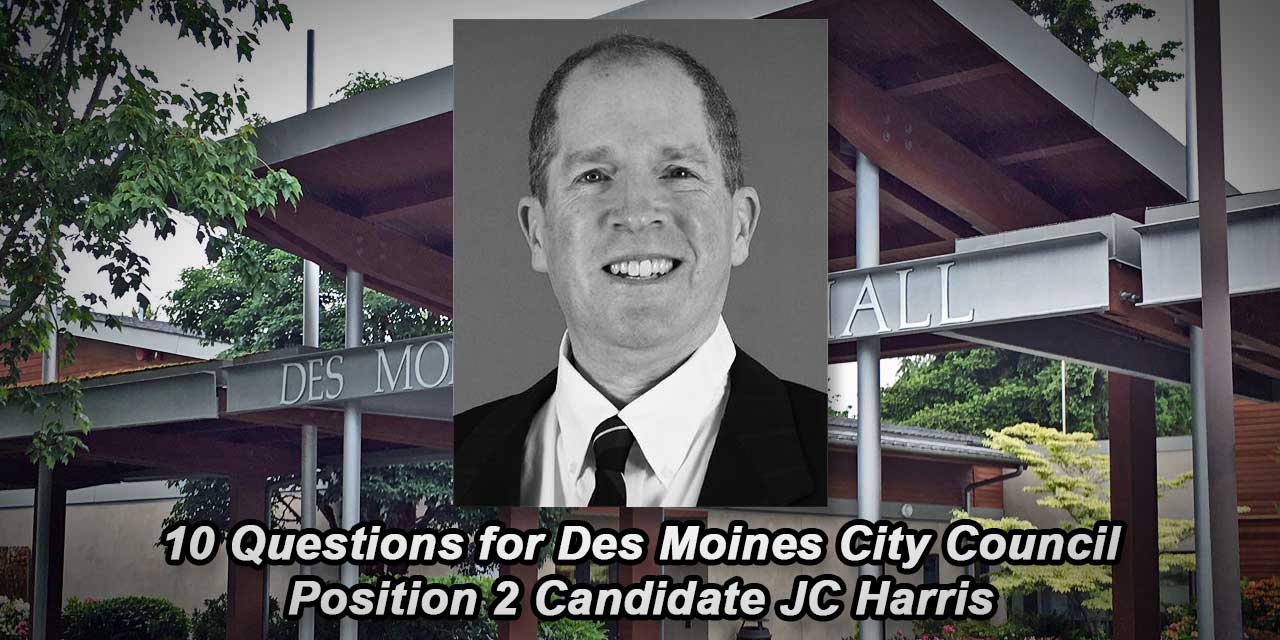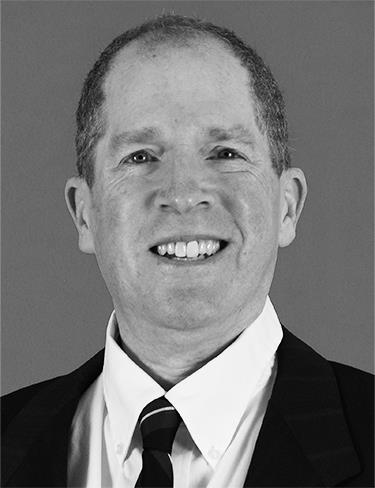Each candidate running for the Des Moines City Council Nov. 7, 2023 General Election was asked 10 questions by The Waterland Blog, covering topics like their reasons for wanting to serve on the council, what they think about current issues in the city, and what kind of solutions they have.
The following responses to our questionnaire in our series is from Des Moines City Council Position No. 2 candidate JC Harris, an incumbent who is running against former councilmember Rob Back.
Ballots will be mailed out on Oct. 18, and are due by 8 p.m. on Tuesday, Nov. 7, 2023.
NOTE: Photos, links and the order of how candidates are presented are identical to the King County Elections website.
JC Harris
1. Why are you running for city council? Please explain what inspired you to run and why you are qualified.
“I’ve been honored to represent you on the Des Moines City Council since 2020. I’m running again to continue my efforts to make our city the best place in Puget Sound to raise a family.
“I was a professional engineer. The company I co-founded helped other businesses improve product and service quality in accounting, logistics and customer service. I was also a successful small restaurant owner. That experience in particular taught me how much of a difference small business can make to a thriving downtown.
“I’ve been sailing and fishing from our Marina since the early 90’s. I’m also a longstanding parish member at St. Philomena. I began regularly attending City Council meetings in 2008. In 2016 I helped start SeaTacNoise.Info, a non-profit working to obtain relief from the negative impacts of Sea-Tac Airport.”
2. What are the three biggest issues facing Des Moines residents, and how can they be solved?
“Lack of revenue. Lack of transparency. Lack of vision. I could have said Crime, Housing, Homelessness, Parks, Programs for Kids, Downtown, and Airport Impacts; but none of those problems can be solved without addressing these three first. For decades, we have not and still do not generate nearly enough revenue. It’s been difficult for the public to see this due to that lack of transparency. And despite having one of the most beautiful locations in all of Puget Sound we have failed to establish any well-defined path to achieving the service levels and amenities residents expect. You can’t get somewhere until you know where you’re going and how you plan to get there.”
3. What are your thoughts on local crime, and the job the Des Moines Police Department is doing?
“We have a new Chief of Police and that is a positive step. However, we also have a dozen fewer officers for patrol than 20 years ago—despite a 12% increase in population. In addition to the recent increase in violent crime, we seem to have accepted property crime almost as a given. And it often feels as though we try to avoid Pacific Highway, rather than seeing it as a key opportunity to bring economic vitality to the area. Therefore, I believe that a top priority should be restoring those staffing levels. Tech is good, but no amount of tech is as good as having a police officer on your street. And that is why I wrote that revenue is our biggest issue.”
4. What is your opinion on how City Manager Michael Matthias is doing?
“In 2014 Mr. Matthias was hired as Economic Development Director. He was chosen by the 2016 Council during a period of financial crisis. He has put our books back into the black and has been rewarded with the highest compensation in the region. However, economic development continues to lag. Moreover, the lack of transparency and ongoing poor communication with both the public and the Council has become evident even to casual observers. This is of particular concern because good government is not an end unto itself; it is a key driver of success, particularly in long term plans–like our downtown. As just one example, the way the hotel was handled was no one-off; it is emblematic of the way the City currently handles every project. That must improve.”
5. How do you think the city is handling issues regarding airplane noise and pollution from Sea-Tac Airport?
“If Sea-Tac Airport were regulated like a factory, it would be the largest polluter in King County. Unfortunately, aviation emissions are invisible. I say ‘unfortunately’ because I believe that because people cannot see them, and because we’ve lived with them for so many years, they’ve somehow become ‘acceptable’. They’re not. Every year the news on their health impacts gets worse—especially for our children where long term exposure creates irreversible problems.
“Also, there is the noise, increases in crime, decline in public education, and environmental damage such as loss of tree canopy. Our City’s economy, which used to be much better, has never recovered from the Third Runway. All these problems relate directly to our proximity to the airport. So apart from any discussions of ‘second airports’ or ‘flight paths’ or ‘electric planes’ or anything else in the distant future, we should be compensated for those impacts like any other factory town. Now.
“Governments of factory towns always negotiate for ongoing compensation to address those acknowledged community impacts. And we should do the same. (See Lack of Revenue above.)”
6. What are your thoughts on building a hotel near the Des Moines Marina?
“Could we develop a great hotel near the Marina? Absolutely! In fact, no one I’ve spoken with objects to that concept, or repairing our docks, or anything else that provides measurable and lasting benefit to the City.
“However, the overwhelming majority of residents did not want a hotel in the North Parking Lot—which is exactly what the City Manager (and the Council majority) proposed and supported–despite attempting to walk that back when the public rose up to say ‘enough’.
“As the City Manager has said, I led the charge in opposing the current Marina Redevelopment process from the beginning because it always lacked (and continues to lack) any semblance of transparency, vision or community engagement. We’ve never had a business plan that passes even casual scrutiny.”
7. What are your thoughts on the passenger ferry pilot program?
“As I wrote, the current management handles every major project exactly the same. And the ferry program has been handled just as poorly as the hotel. Both were implemented using magical thinking but without even a proper feasibility study. The public assumes that these ideas pencil out. They don’t.
“Over the past fifteen years three government agencies independently concluded that a passenger ferry from Des Moines will lose at least $1.5 million a year. And yet we allocated almost $1,000,000 to create our own, and continue to pay a consultant $5,000 a month to promote the concept. In its first year, a 63 passenger boat lost money. In the second year it broke down before reaching the Marina. And now, we seem to be contemplating the purchase of a six person electric ferry costing $550,000. It would be laughable if it were someone else’s money. But it’s not. It’s your money, money we could spend on something useful. There is nothing funny about it.”
8. Do you have any ideas on how to help Des Moines businesses that are struggling from recent issues, like COVID or increasing crime?
“I support doing what other successful cities already do: a director level position in charge of branding, recruiting businesses, mentoring businesses, and supporting businesses, throughout the entire City—not just the downtown. There are also some basic changes we should have made years ago to improve permitting, signage and especially parking. If we want a thriving retail sector the default answer needs to become ‘yes’.
“Long game, we need to develop a magnet to the downtown core and I believe that could be a grocery store, purchased by the City—along the same lines as the current Waterfront Market. Unlike the ferry, this is something that the entire community desperately wants and would support. But it will not happen without our help. If we re-allocated the ferry money we could do this now. That’s real economic development.”
9. How would you change recent issues having to do with the “boil water” advisory or ongoing sewage spillages in Des Moines?
“Despite our small size Des Moines has five special purpose districts (water, sewer, storm water), independent governments over which we have no control. In 2020 I proposed that the City host a Water Summit of all State and local leaders to see how we could develop a long-term, holistic plan. That did not happen. But it should because we continue to have at least one water quality emergency a year—including the recent boil water notice; which was a repeat of a 2013 event. But despite so many advances in technology, if anything, the communication was poorer than ten years ago.
“The one thing the City can do right now is provide an emergency alert system, reaching every person in Des Moines via phone or TV, whenever there is potential danger of any kind. The tech is available now—as anyone who has received an Emergency Broadcast message knows.”
10. How would you balance the needs and interests of different neighborhoods and communities in Des Moines?
“From day one, I’ve promoted better communication. That is why I publish a Weekly Update with information about the Council and important City events and history. But my real goal was always to increase participation. We cannot represent the public fairly unless we get more participation from all neighborhoods. That should be the City’s highest priority because without a balance of voices, every City will have blind spots and be prone to biases from the few.
“We should use the data we already collect to provide monthly, neighborhood-level reporting, on every aspect of City-life–including public projects and policing. Let the public see where crime activity actually is, and where their money is being spent.
“We should also implement a strong digital presence, including a phone-based app. Fewer and fewer residents now respond to print, which is expensive and inaccessible to people in various languages or who have certain disabilities. The one thing almost every person in Des Moines has today is a cell phone—a computer that speaks your language. We can use that to provide valuable services everyone will want—including those emergency alerts. That is how people engage with the world today and that is how our residents want to engage with us.
“My belief is that the easier we make it for all our residents to engage with us, the more people will participate in local government. And the more people from all neighborhoods who participate, the better we will represent all of Des Moines.”



